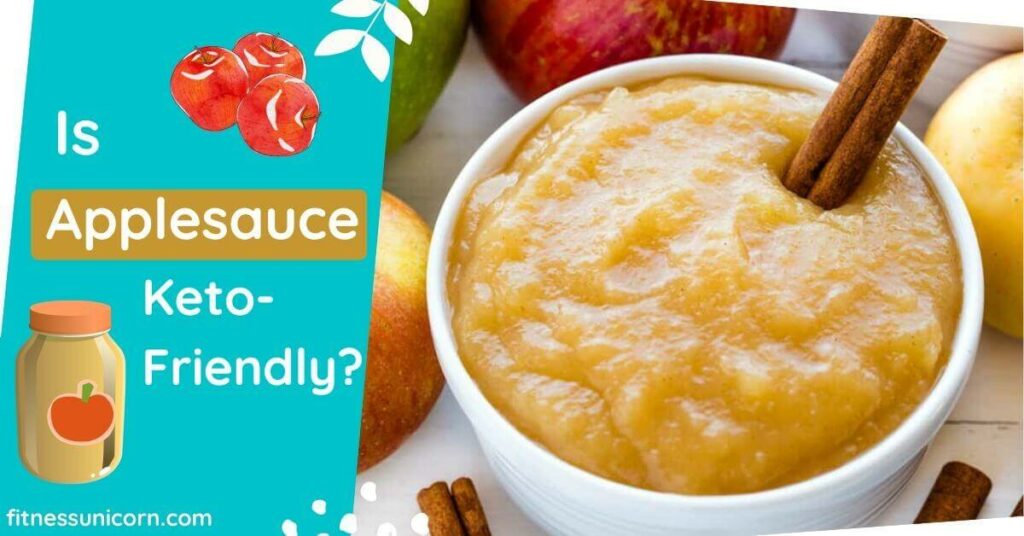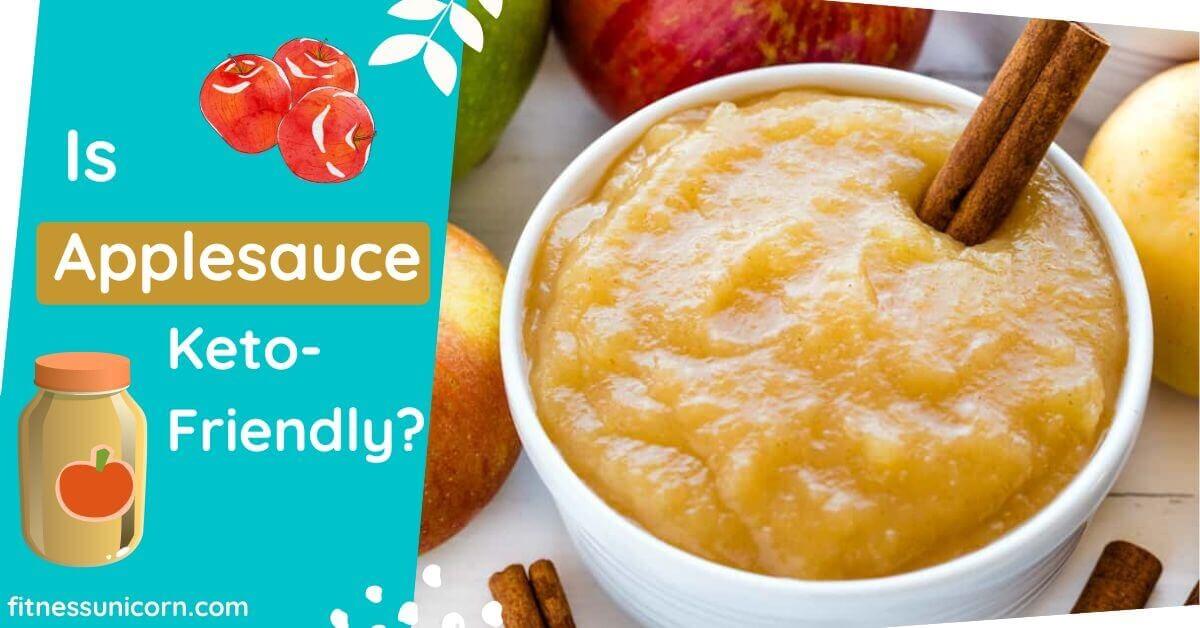Low-carb, high-protein meal plans are the main focus of attention in the world of countless weight loss diet options. This group includes the Atkins, Paleo, and South Beach diets.
They are also known as “keto” or “ketogenic” diets. However, all of those fats, cheeses, and meats make you feel sluggish, so you wish you could have some fruit like an apple. And the question comes. Is Applesauce Keto?
But given that the fundamental tenet of the ketogenic diet is that all sources of carbohydrates are prohibited, how can apple sugars be included in it?
Could applesauce make a difference? You can keep your daily carb intake on a ketogenic diet to 20–30g (in some cases 50g).
A typical apple weighs between 70 to 100 grams and has 11 grams of net carbs, all of which are sugar (albeit natural).
Applesauce is only keto-friendly in moderation because a half-cup serving of unsweetened applesauce has 12 grams of net carbs.
You may still accommodate it in your daily carb budget depending on how many carbs you’ve left for the day.
In this article, we’ll read how applesauce could be a part of the keto diet and also look at some of the best alternatives at hand.

An Apple a Day Keeps the Doctor Away?
Who hasn’t heard the proverb “an apple a day keeps the doctor away” at least once in their life? An exceptional balance of minerals found in apples guarantees special health benefits.
With only 80 calories, a medium apple (160g) offers the body large amounts of fiber, vitamin C, potassium, and flavonoids. The apple’s insoluble fiber speeds up transit time by promoting improved digestive health and digestion.
As a result, they greatly aid in the prevention of colon cancer and the alleviation of constipation. Regarding the soluble fiber in apples, it appears that they lower blood levels of “bad” LDL cholesterol.
Strong antioxidants found in apples include vitamin C, quercetin, catechin, chlorogenic acid, etc.
Antioxidants have the ability to chemically react with oxygen free radicals to render them harmless and inactive, giving them preventive capabilities for cardiovascular health.
In fact, numerous studies have demonstrated a link between eating apples and a lower risk of dying from a heart attack. It has been noted by some scientists that eating apples may help prevent lung cancer.
Due to their antioxidant characteristics, apples have generally been related to enhancing respiratory function in adults.
Because apples have a low glycemic index, eating them does not result in a sudden spike in blood sugar levels, which is crucial for maintaining optimum euglycemia, especially in those with elevated sugar levels.
Also, did you know that the apple is the ideal fruit for regulating your appetite? And thanks to its phosphorus content, it can help you sleep better and improve your memory.
Apple skin contains a powerful antioxidant known as quercetin, which is even more powerful than vitamin C when it comes to protecting brain cells against damage caused by free radical build-up.
And do not forget that the apple has earned the nickname “nature’s toothbrush” because it helps clean your teeth. It reduces the number of bacteria that form dental plaque, which results in tooth decay.
It can be useful in case of an emergency when you don’t have a toothbrush and toothpaste.
FIND MORE: Is Joseph’s Pita Bread Keto?
Applesauce’s nutritional profile
Applesauce has been produced for hundreds of years. Boiling apples creates a smooth puree that, depending on the apple variety and the spices added, can be sweet, sour, or salty. There are numerous ways to consume this fruit sauce.
You can use it in smoothies, baked goods, salad dressings, and meals that include meats and veggies.
You may be pondering whether applesauce has the same health advantages as whole apples have given its long list of acknowledged advantages.
Plain applesauce has fewer calories, fat, and sodium than entire apples. It has a modest amount of natural sugars and carbs in addition to trace levels of minerals including copper and vitamins C and E.
However, the presence of additional nutrients including fiber, vitamins, minerals, and antioxidants is influenced by a number of important variables.
They consist of:
- Apple variety used.
- How are apples processed?
- Cooking temperature.
- It was the skin included in the sauce.
An average 1/2-cup (122-gram) serving of unsweetened applesauce contains:
- Calories: 51
- Protein: 0.2 gram
- Fat: 0.1 gram
- Carbohydrates: 13.7 grams
- Fiber: 1.3 gram
- Sugar: 11.5 grams
Applesauce can offer a variety of distinct advantages in addition to being low in calories and possessing nutrients that assist human health. It can encourage a healthy diet and lower the chance of developing chronic diseases.
Applesauce can have the same health advantages as whole apples because it is produced with whole apples and a few additional essential ingredients.
However, depending on how it is made and how much sugar is added, if any, applesauce’s nutritional profile can change significantly.
When combined with other fruits, unsweetened applesauce can help you adhere to healthy dietary recommendations.
YOU MAY ALSO LIKE: Are Leeks Keto Friendly?
Applesauce: The healthiest substitute for the Keto diet And the Benefits
Your mind is calmed and you feel satisfied after cooking, especially when you make desserts! However, butter in desserts might be harmful! With butter substitutes, you will reduce calories, fat, and cholesterol.
There are many ingredients that you can use instead of butter and one of them is applesauce.
Your sweets will remain with the necessary moisture and will become tastier with a little apple puree. This particular butter substitute adds fiber and moisture while reducing calories.
Use as much applesauce as the amount of butter your recipe calls for.
Therefore, we use applesauce in many recipes for cakes, cookies, muffins, cereal bars, granola, etc. It also goes well with pancakes and waffles, and even roasts pork.
In the Keto diet, however, it is eaten as a simple and healthy dessert, with yogurt, or, simply, accompanied by walnuts, other nuts, dried fruits, and plenty of cinnamon. So it is the perfect substitute for your dessert pleasure.
The benefits of applesauce except that it’s delicious are a lot. Whenever you were sick as a kid your mom or grandma probably made applesauce for you to eat.
It is extremely common for children who experience intestinal or digestive problems. It may have been a long time since you last enjoyed this sauce but it has many beneficial properties that you should know about.
Apples are one of the healthiest fruits in the world and therefore it is a very good idea to consume them.
In addition to raw (with or without the skin, depending on your preferences) or roasted, you definitely have a recipe that is passed down from generation to generation: applesauce.
Applesauce may reduce the risk of cardiovascular disease or cancer, including chronic diseases, for example. For this reason, it is also ideal for adults.
When you add honey and cinnamon to the mix you not only make it tastier but actually enhance its benefits.
On the other hand, if you want to lose weight, applesauce can still help you. A cup of unsweetened applesauce contains only 100 calories.
For many people, this is enough to go a few hours without eating or not be tempted to eat something unhealthy.
How to Choose the Best Alternatives for Applesauce in Keto Diet?
There are many alternatives for replacing the applesauce as there are some fruits that can be made just as delicious and especially in many recipes for your Keto diet. The best fruit alternatives to make a sauce are:
Blueberries
They are extremely high in fiber; one cup contains almost 8 grams. The same amount gives six grams of net carbohydrates, so you can add a small amount to yogurt and enjoy a nutritious and delicious breakfast.
Avocado
The creamy fruit has a place in the ketogenic diet. Half an avocado contains 15 grams of heart-healthy good fats and two grams of net carbs.
Raspberries
Half a cup contains 3 grams of net carbs. Add them to a salad or mix them with yogurt for a refreshing dessert.
Strawberries
Half a cup contains over 4 grams of net carbs or about 20% of your daily needs.
Tomatoes
Some consider it a vegetable and others a fruit. Half a cup contains two grams of net carbs.
Coconut
Half a cup of coconut contains 13 grams of fat and 2.5 grams of net carbs. Sugar is often added to coconut, so make sure you choose unsweetened or buy whole and shred it yourself.
Also, let’s not forget the precious apple fibers that we can easily find to replace applesauce. Apple fiber is a natural substance made from processing and producing apples.
A top-notch source of both soluble and insoluble dietary fiber is apple fiber. The product is processed by extracting the juice and then compressing it naturally to maintain the pectin and aroma.
Apple fiber promotes healthy bowel movements and the elimination of toxins from the digestive tract. Apples’ fiber aids in restoring normality to your digestive system and bowel motions.
They have a reputation for assisting with gastrointestinal issues like diarrhea and constipation.
Benefits:
- Promotes healthy saturated fat levels
- Increases circulatory function
- Helps improve the essential health of the heart
- Cleanses the digestive system
- Strengthens organ function and improves general health
- Helps to remove toxins and excess trace elements
Use: 1-2 tablespoons (usually before or between meals). We can add them to juices, yogurt, muesli, or pastry dough, limiting the corresponding amount of flour, reducing carbohydrates, and creating products that fit perfectly into a Keto diet.
Wrapping Up
So to summarize, is Applesauce Keto? All fruits, as we are well aware, contain carbs. But other fruits—among them the apple—has higher fiber and water contents, which translate into lower sugar contents.
Applesauce is a nice way to fit carbs into a Keto diet.
First of all, it is important to keep in mind that it is essential to any healthy eating strategy. This is specifically due to the fact that it contains a lot of micronutrients, such as vitamins, minerals, and antioxidants.
On average, a Ketogenic diet results in a weekly body fat loss of roughly 1 kg.
In fact, because ketosis produces diuresis in the first 14 days, the scale may indicate that you’ve lost more (an additional 2 to 4 kg of fluids), but if you stick with it, you’ll discover that you’ve shed fat!
A whole food group ban seems harsh; shouldn’t we consume all foods in moderation? This is the reality.

